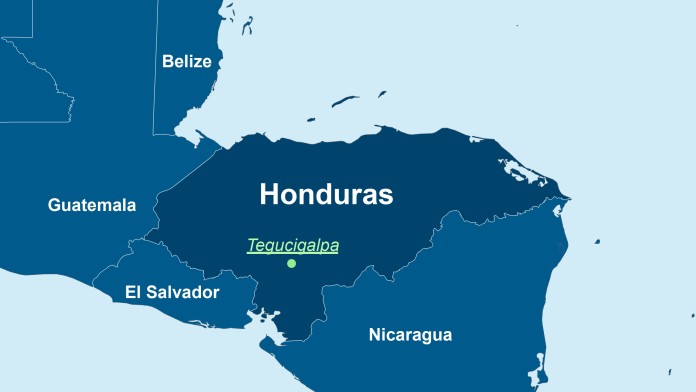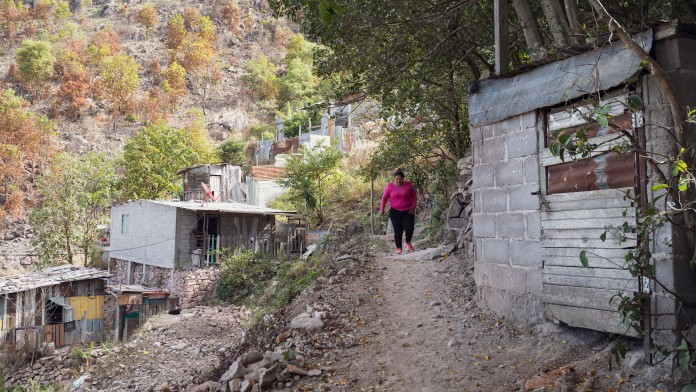
As of: 08/2022
Climate change is increasing the frequency and intensity of extreme weather events in Central America. Hurricanes and heavy rainfall are causing floods and landslides in cities. The steep hillsides of Honduras are a potential source of danger. Urbanisation, which often goes unchecked, exacerbates these impacts even further. Many poor urban districts are located in high-risk zones and are particularly vulnerable to extreme weather events. In 1998, Hurricane Mitch swept across Honduras with devastating consequences, leaving more than 5,000 dead and resulting in economic losses of USD 2 billion. KfW is supporting Honduras in its efforts to strengthen its resilience to the consequences of climate change by promoting the construction of appropriate infrastructure and strengthening its capacity to manage climate risks.

Honduras still is strongly affected by climate change. At the same time, the urban population is forecast to grow from around 45% in 2000 to 65% in 2030. Urbanisation is particularly concentrated in the “Distrito Central” in the capital of Tegucigalpa. More than 30% of the houses here are located in disaster risk zones; almost a quarter of the basic infrastructure is threatened by floods and landslides.
Urban development adapted to climate change can protect human lives and limit economic damage caused by weather events and climate change. To this end, the KfW programme involves the construction of green and grey infrastructure for adaptation and disaster prevention.
The FC measure aims to strengthen the capacities of the participating institutions in managing climate risks and climate adaptation and to educate the population in dealing with climate risks. With a total of EUR 23 million from budget funds, KfW Development Bank is supporting the Honduras government in two phases of urban climate adaptation in the “Distrito Central” municipal district. The project executing agency is the municipal administration of the Central District (Alcaldía Municipal del Distrito Central – AMDC) in coordination with the civil protection agency (Comisión Permanente de Contingencia –COPECO) for disaster risk management and the Ministry of the Environment (Secretaría de Energía, Recursos Naturales, Ambiente y Minas – MiAmbiente) for climate change.Heavy rainfall events and hurricanes often lead to flooding in Honduras and can cause devastating landslides, especially on unprotected hillsides. To be able to handle the huge amounts of water during heavy rainfall, various grey infrastructure measures such as absorption wells, drainage systems or water retention basins are being developed within the scope of the project. Retaining walls, stabilised embankments and newly planted trees secure unprotected hillsides. Risk areas are afforested or converted into urban green areas to prevent anyone from living there. Adapted land-use plans that designate safe residential areas and new building regulations introduce regulated and resilient urban development. It is also important that the population affected is better informed about the consequences of climate change and the associated dangers. To this end, the central institutions for risk management (COPECO) and climate change adaptation (MiAmbiente) in Honduras are being supported in developing training for the civilian population. Certification systems are also being created for protection officers who will also help to warn and inform the population. In addition to information materials and the development of a curriculum to train civil society, KfW financing also includes interlinking various relevant institutions.
To identify risks as early as possible, KfW is also supporting the establishment of an early warning system for Tegucigalpa that uses, among other things, a geographic information system (GIS). It can be used to create risk maps and simulation models. The respective AMDC employees are trained in how to use the individual technologies. The interplay of technical equipment, the population's high level of risk awareness and strengthened institutions mitigate the dangers for the population.
Protection against flooding and landslides by grey and green infrastructure contributes to improving the living conditions of about 150,000 mainly poor people in the “Distrito Central”. New land-use plans and risk mapping shift residential development to safe areas and introduce regulated urban growth. Providing the civilian population with better information will help to prevent the development of informal communities in risk zones. Risk assessment will also improve because municipal protection officers will be certified in the future. These various measures, combined with a new early warning system, will make it possible to respond quickly in the event of a disaster.
The project contributes to the achievement of these following United Nations Sustainable Development Goals:
KfW Group
KfW Development Bank
Palmengartenstrasse 5–9
D-60325 Frankfurt am Main
+49 69 7431-0
Urban and social development Latin America
Centre of Competence for Infrastructure and Natural Resources
Share page
To share the content of this page with your network, click on one of the icons below.
Note on data protection: When you share content, your personal data is transferred to the selected network.
Data protection
Alternatively, you can also copy the short link: https://www.kfw-entwicklungsbank.de/s/enzBZC5c
Copy link Link copied